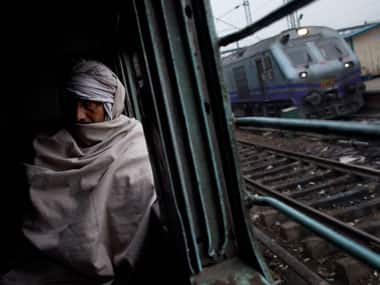After a budget in which Railway Minister Suresh Prabhu said that he didn’t want to lean too much on the Finance Ministry for funds, the Economic Survey today recommended that the government should revive public investment in services like the Railways which can act as a ‘key engine of growth’ in the short run. However, it had a caveat: all funds have to be reform-linked. “The Survey says that public investment in an efficient rail network can have positive effect on both manufacturing and aggregate output and the effects are permanent,” a government release said. The survey had advocated the need for “a bold, accelerated programme of investment in dedicated freight corridors (DFCs) that can parallel the Golden Quadrilateral in the road sector along with associated industrial corridors.” [caption id=“attachment_2125469” align=“alignleft” width=“380”]
 AP image[/caption] It has also recommended that the Modi government invest in the development of railways, much like the Vajpayee government had invested in roads, saying that this boost in spending could in turn boost private investment without jeopardising India’s public debt dynamics. It says that the investment would give a boost to the Make in India initiative. The survey pointed out that successive plans had allocated less resources for the development of railways as compared to other transport sectors, a situation that still exists today. It advocated spending on the railways on the grounds that it would link markets, reduce costs and give a boost to manufacturing which was logistics intensive. However, the survey is clear that funding for the railways should only be for commercially viable projects. “In the long run, the railways must be commercially viable and public support for the railways should be restricted to (i) equity support for investment by the corporatized railways entities and (ii) for funding the universal service obligations that it provides. In the interim, there is scope for public support of railways, including through assistance via the general budget,” the release said. It also said funding should be given to the railways only on the basis of reform undertaken by Prabhu and his ministry in the areas of tariff policies and technology.
AP image[/caption] It has also recommended that the Modi government invest in the development of railways, much like the Vajpayee government had invested in roads, saying that this boost in spending could in turn boost private investment without jeopardising India’s public debt dynamics. It says that the investment would give a boost to the Make in India initiative. The survey pointed out that successive plans had allocated less resources for the development of railways as compared to other transport sectors, a situation that still exists today. It advocated spending on the railways on the grounds that it would link markets, reduce costs and give a boost to manufacturing which was logistics intensive. However, the survey is clear that funding for the railways should only be for commercially viable projects. “In the long run, the railways must be commercially viable and public support for the railways should be restricted to (i) equity support for investment by the corporatized railways entities and (ii) for funding the universal service obligations that it provides. In the interim, there is scope for public support of railways, including through assistance via the general budget,” the release said. It also said funding should be given to the railways only on the basis of reform undertaken by Prabhu and his ministry in the areas of tariff policies and technology.
Invest more in railways, but in on commercially viable projects: Economic Survey to Modi govt
FP Staff
• February 27, 2015, 13:56:16 IST
The survey has recommended that the Modi government should invest in the development of railways like the Vajpayee government had invested in roads.
Advertisement
)
End of Article